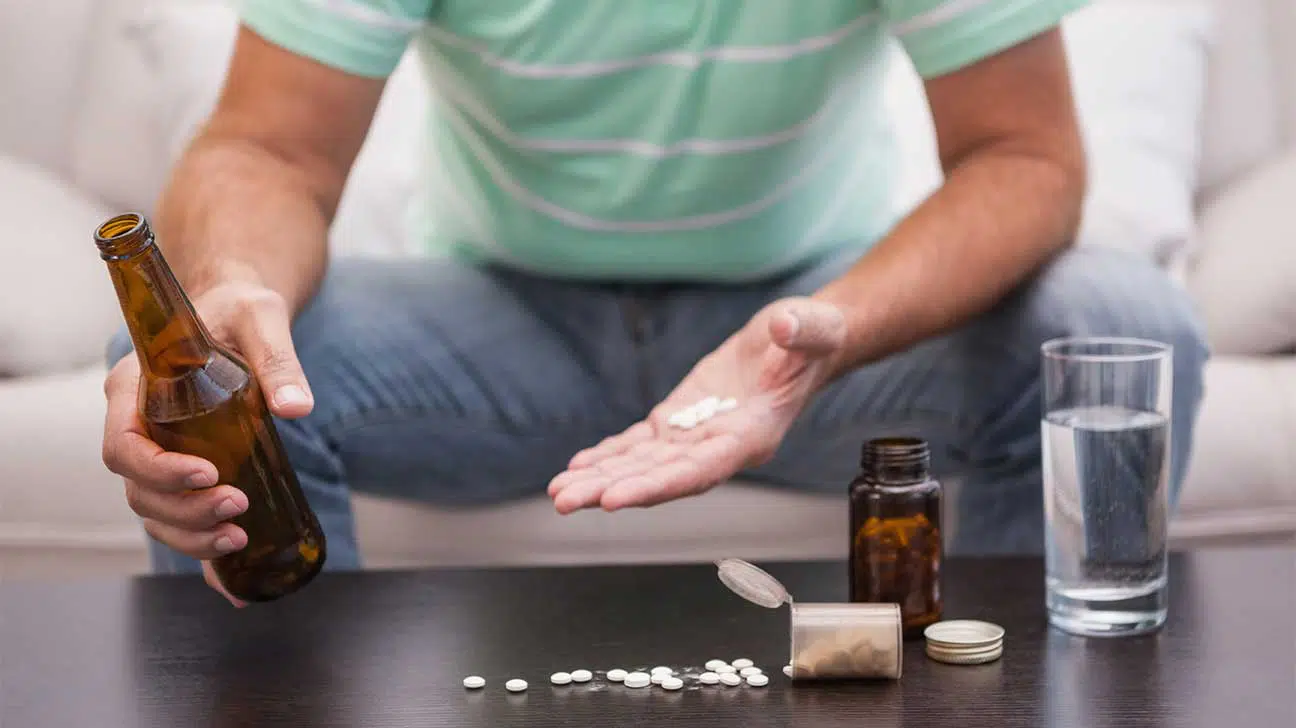
Alcohol belongs to a class of substances known as depressants. This means it slows down activity in the central nervous system.
Combining alcohol with other prescription, illicit, or over-the-counter depressants can be dangerous, due to the synergistic effect this can have.
Drinking alcohol in combination with other depressants can also be a sign of drug abuse or addiction, for which substance abuse treatment is highly recommended.
Learn more about the dangers of mixing drugs.
What Happens When You Mix Alcohol With Depressants?
Alcohol, like other depressants, slows down activity in the brain and spinal cord, which can slow a person’s breathing, heart rate, and cause drowsiness and mental fogginess.
Taken together, alcohol and depressants can have compounding effects, which can cause a person to become intoxicated much faster and have severe effects on breathing and heart function.
Dangers Of Mixing Alcohol With Depressants
Drinking alcohol while taking depressant drugs can be dangerous, particularly when these drugs are misused.
Primary dangers of mixing alcohol with depressants include:
- faster intoxication
- alcohol poisoning
- respiratory depression
- very low blood pressure
- seizures
- coma
- death
Mixing alcohol with other prescription or illicit depressants can increase the risk of overdose, which can be fatal in severe cases without prompt medical treatment.
Mixing Alcohol With Opioids
Opioid drugs, such as heroin and prescription opioids, are a class of strong painkillers. Mixing alcohol with opioids can be a dangerous and potentially lethal combination.
Combining alcohol with opioids may cause:
- slow or stopped breathing
- difficulty breathing
- unresponsiveness
- dizziness
- nausea and vomiting
- weak pulse
- seizures
- death
Before taking a prescription opioid, talk to your doctor about the safety of drinking alcohol while taking this medication.
Read more about mixing alcohol with opioids.
Mixing Alcohol With Benzodiazepines
Benzodiazepines are prescription drugs that are commonly used as a short-term treatment for anxiety, panic attacks, insomnia, and seizures.
Common benzodiazepines include:
- Xanax (alprazolam)
- Ativan (lorazepam)
- Klonopin (clonazepam)
- Valium (diazepam)
- Librium (chlordiazepoxide)
- Halcion (triazolam)
Drinking alcohol while taking benzodiazepine drugs can be risky. This can enhance the effects of both drugs, causing dizziness, slow breathing, blackouts, and impaired balance.
Read more about mixing alcohol and benzodiazepines.
Mixing Alcohol With Barbiturates
Barbiturates are a class of older sedatives that were commonly prescribed for seizures and insomnia in the 20th century. Their use has largely been replaced by benzodiazepines.
Mixing barbiturates with alcohol can have toxic effects. Together, this can overwhelm the body’s central nervous system, resulting in severe and potentially fatal intoxication.
Mixing Alcohol With Other Depressants
Alcohol can be dangerous when mixed with other depressants, such as Ambien, gabapentin (Neurontin), and over-the-counter sleep aids.
Mixing alcohol with these other depressants may cause:
- unusual or reckless behavior
- memory loss
- intoxication
- poor balance
- impaired coordination
- dizziness
- sedation
- severe hangover
Before taking a depressant medication, talk to a doctor about the risks of drinking alcohol while taking a prescription depressant or over-the-counter sleep medication.
Risks Of Mixing Alcohol With Depressants
The compounding effects of alcohol combined with other depressants can have significant effects on the body, brain, and behavior.
Risks of mixing alcohol with depressants include:
- increased risk for motor vehicle accidents
- faster and more severe intoxication
- drug and alcohol dependence
- development of drug addiction
- significant cognitive impairment
People who abuse alcohol in conjunction with depressants are at higher risk for developing a severe substance use disorder, as well as drug overdose and alcohol poisoning.
Overdose Signs And Symptoms After Mixing Depressants
Alcohol poisoning and drug overdose can both occur after mixing alcohol with other depressants.
Signs and symptoms of overdose might include:
- vomiting
- shortness of breath
- very slow breathing
- weak pulse
- low blood pressure
- confusion
- stumbling
- collapsing
- seizures
If someone is experiencing seizures, has stopped breathing, or has collapsed after mixing alcohol with depressants, call 911 right away. Without treatment, this drug combination can be lethal.
Treatment For Alcohol And Depressant Drug Abuse
Mixing alcohol with opioids, benzos, or other depressants can be a sign of drug and alcohol abuse, which may require treatment to overcome.
Treatment for drug and alcohol abuse, or polysubstance abuse, is offered in both inpatient and outpatient rehab settings.
Rehab programs for multiple addictions can offer:
- detox services
- individual counseling
- behavioral therapy
- medication
- group therapy
- couples and family counseling
- holistic therapies
- relapse prevention
By talking to one of our addiction specialists, we can help you determine which type of treatment program may be best suited to meet the needs of yourself or a loved one.
Call To Find Treatment For Polysubstance Abuse Today
Overcoming drug and alcohol misuse is possible with a treatment program that can offer the level of support a person needs.
To find a treatment program for drug and alcohol abuse near you, call our helpline today for more information.
Addiction Resource aims to provide only the most current, accurate information in regards to addiction and addiction treatment, which means we only reference the most credible sources available.
These include peer-reviewed journals, government entities and academic institutions, and leaders in addiction healthcare and advocacy. Learn more about how we safeguard our content by viewing our editorial policy.
- American Society of Anesthesiologists—Mixing Opioids and Alcohol May Increase Likelihood of Dangerous Respiratory Complication, Especially in the Elderly, Study Finds
https://www.asahq.org/about-asa/newsroom/news-releases/2017/02/mixing-opioids-and-alcohol-may-increase-likelihood-of-dangerous-respiratory-complication - University of Michigan—The Effects of Combining Alcohol with Other Drugs
https://uhs.umich.edu/combine


